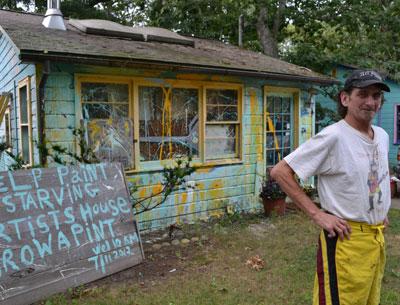Springs ‘Artist’ Has House Repainted

Only in the Hamptons might a work of abstract art, albeit a haphazard one, be used to gauge whether officials were on the right track in charging someone with a violation of law. Rian White, who had been in a five-year back-and-forth with the Town of East Hampton, which ended when a collection of what some of his neighbors considered junk was hauled away from his Springs property, is in hot water again.
Mr. White had been cited repeatedly for not clearing his yard of car parts, tires, tools, a casement window — all manner of scrap. In 2009, the town hired an outside contractor to take it all away. (Town employees had refused to do so.) Mr. White wound up paying the hauler’s $14,000 fee through his property tax bills, but the town apparently wasn’t through with him.
In March, the town sent him a summons along with a copy of a section of the town code that refers to the paint on one’s house. (The town complies with New York State property maintenance statutes.) The statute reads: “All exterior walls shall be free from holes, breaks, and loose or rotting materials; and maintained weatherproof and properly surface-coated where required to prevent deterioration.”
Mr. White saw it as a hint that the paint on his house, on Fanning Avenue, was peeling, and, in response, put up a sign in his front yard: “Help paint a starving artist’s house. Throw a pint.”
The sign did not say what color, or where to throw it. Mr. Rian now points to the front of his house as an Abstract Expressionist work in progress, with blue and yellow blotches on a light green background and one forceful yellow streak, a lightning bolt of sorts, across the glass panels of the front door.
“The town told me I didn’t have enough paint on the house. None of my neighbors have paint. If you have cedar shake they don’t have to paint their houses. So, I put ladders up, had neighborhood kids over, and they threw paint at the house. I’m going to paint the sides like a regular color, but I like what happened to the front. I took 190 photos of different sections, five by six. They came out nuts,” Mr. Rian said on Tuesday.
Mr. White reported that he had missed a June 9 court appearance. “I called them that morning and said I was busy painting and didn’t have a ride up there.” He said yesterday that he imagined the town had ordered him to appear in court on another date, but he hadn’t checked his mail box.
He might have painted his house the traditional way, “but the town took all my paint, brushes, and took a brand-new Anderson casement window, put it in a truck and crushed it,” he said, referring to incident in 2009, which he videoed and titled “Trampled,” Parts One and Two.
Meanwhile, Lawrence Kelly, who is representing a number of local business owners who have run afoul of town enforcement, thinks Mr. White may be the canary in the Constitutional coal mine. A former federal prosecutor based in Garden City, he expects to file a class-action suit against the town within two weeks on the grounds that code enforcement here is unconstitutional.
Although not representing Mr. White, Mr. Kelly said the case was important as an example of the town’s “reactive departments. They have become reactive to singular neighbors. Singular neighbors move the government.”
Mr. Kelly is representing Tom Ferreira of Montauk, an auto mechanic who has filed a $55 million civil rights action against the town in federal court in May. Cars, car parts, and tools were removed from Mr. Ferreira’s Navy Road property, Mr. Kelly said, without a warrant, although he had a pre-existing, nonconforming right to operate a garage. He was charged $19,500 for two separate hauls by Trinity Transportation, the same contractor hired in the Rian White case, and because he has been unable to pay it, a tax lien has been placed on his property, making foreclosure a probability.
Mr. Kelly faulted the concept of town board member liaisons. “For the past eight years you’ve had this split in management, so you end up with people like Ferreira, or simply because a neighbor doesn’t want to live next to Mexicans, they are raided.”
The class action suit Mr. Kelly plans to bring is based on his contention that because the town did not exempt its own code from requirements of the state fire, building, and property maintenance codes in 2003, “summonses are void, unenforceable, and issued by guys who are not authorized. Everything in the same area is pre-empted, unenforceable, and void. But, they have been issuing them all this summer.”
Mr. Kelly said that because the code enforcement employees were not authorized under state law, their actions are unconstitutional. “I’m going to have thousands of claimants.” He has warned the town that it is facing financial Armageddon in open town board meetings.
“This Rian White thing is them testing the waters to see if anyone’s still looking,” Mr. Kelly said.
Mr. White said: “The whole thing with Tom [Ferreira] is giving me renewed knowledge that this is a bunch of crap. I’m a firm believer in the Constitution of the United States, and it’s getting walked all over in this town.”
Asked about Mr. Kelly’s assertions regarding the legal authority of the town’s code enforcement office, Supervisor Bill Wilkinson said yesterday that he had questioned the attorney in response to the same claims he had made several times to the town board.
“He suggested I set up some kind of mediation board, establish some sort of dispute resolution system and bring the parties together. I said, ‘Based on what? I have no proof we have done anything wrong.’ ” Mr. Wilkinson said he had asked that Mr. Kelly’s assertions be researched. “My subordinates are telling me we don’t have a problem,” he said.
